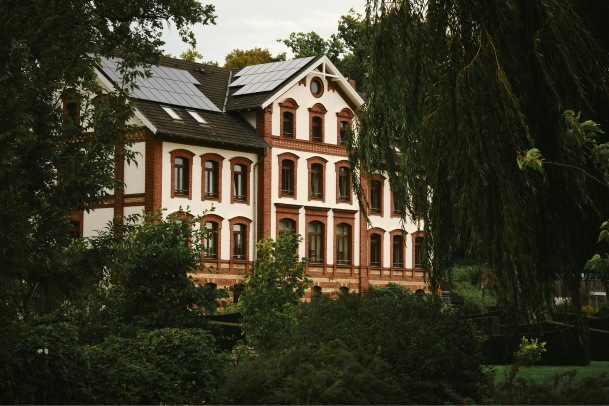
Written by Kayla Jane Barrie Updated on Nov 21, 2025 6 mins read

Need coverage for an older home? Buying older developments has become popular where people purchase older houses in good locations intending to perform a renovation.
Purchasing an old house is a unique experience. They tend to come with more risk, and often require building updates to ensure you can get home insurance.
Whether you've fallen in love with an old Victorian, mid-century ranch, or colonial, you need to understand the costs of insuring older homes fully; we've put together what you need to know to protect your century-old investment properly.
A heritage or century property must be formally recognized by an authoritative source within the province. They can have legal protection, so updates may not be easy to complete by homeowners unless they receive the proper approval and permit.
Owning a heritage property is an investment in Canadian history. Here are some factors that can determine if a property is historic or not :
You can find out if your property meets the criteria by contacting the municipal and provincial government for types of designations and stewardship.
In general, they are more expensive to insure due to the repair and maintenance required. Many were not built to meet today's building and safety standards.
The process of buying an older home and understanding the requirements can be very different – largely because of the risk involved with buying an older house.
Insurers are happy to insure newer builds that are well constructed, well maintained and have been recently built. Heritage properties can be more challenging due to the potential risks associated with outdated wiring, roofs, plumbing, and heating systems.
If you are considering it, here are some of the pros and cons of investing in an older home :
There is a lot to consider when buying an old house. While you are likely thinking about renovations and interior design, what your policy can cover should be at the top of your list.
If your home is over 30 years old, you may be required to upgrade plumbing, electrical or heating before the protection can be active. Here are some of the most common areas that could require updates before getting approval :
If your asphalt roof is more than 25 years old or other roofing materials have exceeded their suggested life expectancy, you may be required to replace it.
Plumbing upgrades from galvanized pipes to copper or plastic pipes may be required.
Steel pipes installed before 1950 typically last 40 to 50 years. After that, they begin to rust or corrode from the inside out. This can result in lower water pressure and an increased risk of leaks or ruptures.
The heating system may need to be replaced or upgraded to secure coverage. Radiant heat panels, space heaters, and furnaces older than 25 years may not be deemed acceptable heat sources.
If the oil tank is more than 25 years old, you may be required to replace it. You may also need to have it inspected and certified by a Technical Standards and Safety Authority (TSSA) inspector.
"Tanks 25 years or older are highly susceptible to rusting, deterioration and leakage and are considered environmental hazards," says FSCO.
Sewer lines and septic tanks may be required to be upgraded or inspected. You may also be required to add additional protection from water damage insurance.
Places built before 1980 may not have wiring or amperage that meets new building standards. You may be required to upgrade from a 60-amp service to a 100-amp service (the minimum building code standard today). This is because insurers are concerned about the threat of overuse and overheating. This increases the likelihood of an electrical fire.
If it has knob and tube wiring or aluminum wiring, you may be required to upgrade to copper wiring. Commonly found in homes over 50 years old, knob and tube wiring can pose greater risks than the copper wiring used today.
If not installed or used properly, wood burning stoves can be a fire hazard. You may be required to have your wood-burning stove inspected by a certified Wood Energy Technical Training (WETT) technician first.
Mortgage lenders require proof before accepting your application for a mortgage. For a prospective buyer planning to purchase an older home, this means you will have to address any issues that prevent you from getting one. Renovations will be required to be completed by the seller or new owner to qualify for the property, so you can also secure a mortgage.
Buying a 100-year-old house can be a large undertaking, especially for homes with a heritage designation.
Houses over 100 years old can also require special considerations. Balancing your insurer's requirements with the renovation guidelines for heritage homes in your area can be a challenge. Since a renovation can cost up to 50% more with the title, it's important that you fully understand what the designation means for renovations.
"A heritage designation, bestowed by federal, provincial or municipal governments, protects the features of a property that are of special heritage interest," says Diane Jermyn in the Globe and Mail.
"What that means for owners of heritage homes is that any plans for repair or alterations must be approved by a committee, generally at the city level," she adds.

The good news is that a heritage designation does not typically increase your costs. The Ontario Ministry of Tourism, Culture, and Sport, explains :
"Your premiums should not go up as a result of a heritage designation. A variety of other reasons cause insurance companies to increase premiums for older buildings if there is a higher risk level, such as outdated services (e.g., old wiring, outdated heating systems). Some companies do not insure buildings over a certain age. The designation itself, however, does not place additional requirements on the insurer and therefore should not affect your premiums."
Below are the top tips from our team of brokers to insure your heritage home:
Whether you are buying a 30-year-old house, buying a 40-year-old house, buying a 50-year-old house, or buying a 100-year-old house, you should always get a home inspection before finalizing the deal.
A home inspection on an older home, or any home, brings to light any issues that could impact your needs. It will highlight :
Consider the cost of these potential upgrades if you plan to bid on an older home in Ontario. Build the total cost of these repairs into the asking price and budget accordingly.
Buying an older home can be a great investment as long as you know what you are getting yourself into. They are usually not turn-key and will require some work once you take ownership.
They are historic buildings or homes valued for their architectural features and connection to historic time - it's compared to owning a piece of history. They must have existed for a century or more.
It depends - you'll need approval from the local heritage committee before you can move forward with any major renovations. If they are approved, there will likely be restrictions on design and materials.
Even if you are renting, you should get tenant insurance to protect you from any unforeseen accidents.
| Categories | Home |
|---|---|
| Tags | Protect Your Home |
Read our insurance blog to get helpful tips, information and news.
Find out if a seatbelt ticket will raise your car insurance rates and how insurers view seatbelt violations.
Ontario’s Project CHICKADEE dismantled a $25 million auto theft ring. Discover how this massive bust targets export enablers and what it means for rising Canadian insurance premiums.
Think refusing a breath test helps your case? In Ontario, it results in a minimum fine of $2,000 and a criminal record. Compare the penalties and protect your future.
Impaired driving in Ontario is a serious offence. Learn about impaired driving fines, penalties, statistics and other important information all drivers in Ontario need to be aware of before they get behind the wheel.